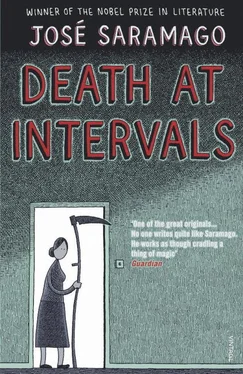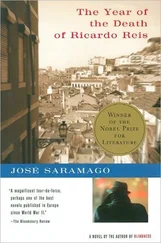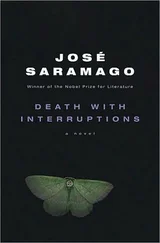José Saramago - Death at Intervals
Здесь есть возможность читать онлайн «José Saramago - Death at Intervals» весь текст электронной книги совершенно бесплатно (целиком полную версию без сокращений). В некоторых случаях можно слушать аудио, скачать через торрент в формате fb2 и присутствует краткое содержание. Город: London, Год выпуска: 2008, ISBN: 2008, Издательство: Vintage Books, Жанр: Современная проза, на английском языке. Описание произведения, (предисловие) а так же отзывы посетителей доступны на портале библиотеки ЛибКат.
- Название:Death at Intervals
- Автор:
- Издательство:Vintage Books
- Жанр:
- Год:2008
- Город:London
- ISBN:978-0-099-50248-7
- Рейтинг книги:5 / 5. Голосов: 1
-
Избранное:Добавить в избранное
- Отзывы:
-
Ваша оценка:
- 100
- 1
- 2
- 3
- 4
- 5
Death at Intervals: краткое содержание, описание и аннотация
Предлагаем к чтению аннотацию, описание, краткое содержание или предисловие (зависит от того, что написал сам автор книги «Death at Intervals»). Если вы не нашли необходимую информацию о книге — напишите в комментариях, мы постараемся отыскать её.
Death does return eventually, but with a new courteous approach – delivering violet warning letters to her victims. But what can death do when a letter is unexpectedly returned?
Death at Intervals — читать онлайн бесплатно полную книгу (весь текст) целиком
Ниже представлен текст книги, разбитый по страницам. Система сохранения места последней прочитанной страницы, позволяет с удобством читать онлайн бесплатно книгу «Death at Intervals», без необходимости каждый раз заново искать на чём Вы остановились. Поставьте закладку, и сможете в любой момент перейти на страницу, на которой закончили чтение.
Интервал:
Закладка:
Death examines the card and finds nothing on it that she has not seen before, that is, the biography of a musician who should have died a week ago and who, nevertheless, continues to live quietly in his modest artist’s home, with his black dog who climbs onto ladies’ laps, with his piano and his cello, his nocturnal bouts of thirst and his striped pyjamas. There must be a way of resolving this dilemma, thought death, it would be preferable, of course, if the matter could be sorted out without drawing too much attention to it, but if the highest authorities serve any purpose, if they are not there merely to have honours and praise heaped upon them, then they now have an excellent opportunity to show that they are not indifferent to those down here labouring away on the plains, let them change the regulations, let them impose some special measures, let them authorise, if it comes to that, some act of dubious legality, anything but allow such a scandal to continue. The curious thing about this case is that death has no idea who they actually are, these high authorities who should, in theory, resolve this dilemma. It’s true that in one of the letters she had written and which was published in the press, the second one if we’re not mistaken, she had referred to a universal death who would, although no one knew when, do away with all manifestations of life in the universe down to the last microbe, but this, as well as being a philosophical commonplace, since nothing, not even death, can last for ever, originated, in practical terms, from a common-sense deduction that had long been doing the rounds of the various deaths in their different sectors, although it remained to be confirmed by a knowledge backed up by study and experience. It’s us sectorial deaths, thought death, who do the real work of removing any excrescences, and it wouldn’t surprise me in the least if, should the cosmos ever disappear, it won’t be as a consequence of some solemn proclamation by that universal death, echoing around the galaxies and the black holes, but merely the accumulation of all those little private and personal deaths that are our responsibility, one by one, as if the proverbial chicken, instead of filling its crop grain by grain, grain by grain, began foolishly to empty it out, because that, I reckon, is what is most likely to happen with life, which is busily preparing its own end, with no need of any help from us, not even waiting for us to give it a helping hand. Death’s perplexity is perfectly understandable. She was placed in this world so long ago that she can no longer remember from whom she received the necessary instructions to carry out the job she was charged with. They placed the regulations in her hands, pointed out the words thou shalt kill as the one guiding light of her future activities and told her, doubtless not noticing the macabre irony, to get on with her life. And she did, thinking that, in case of doubt or some unlikely mistake, she would always have her back covered, there would always be someone, a boss, a superior, a spiritual guru, of whom she could ask advice and guidance.
It’s hard to believe, therefore, and here we enter at last into the cold, objective analysis for which the situation of death and the cellist has long been crying out, that an information system as perfect as the one that has kept these archives updated over millennia, continually revising the data, making index cards appear and disappear as people were born or died, it’s hard to believe, we repeat, that such a system should be so primitive and so unidirectional that the information source, wherever it is, isn’t, in turn, constantly receiving all the data resulting from the daily activities of death on the ground, so to speak. And if it does receive that data and fails to react to the extraordinary news that someone didn’t die when they should have, then one of two things is happening, either, against all our logic and natural expectations, it finds the episode of no interest and therefore feels no obligation to intervene in order to neutralise any difficulties caused, or we must assume that death, contrary to what she herself believes, has carte blanche to resolve, as she sees fit, any problem that may arise during her day-to-day work. The word doubt had to be spoken once or twice here before it rang a bell in death’s memory, for there was a passage in the regulations which, because it was written in very small print and appeared only as a footnote, neither attracted nor fixed the attention of the studious. Putting down the cellist’s index card, death picked up the book. She knew that what she was looking for would be neither in the appendices nor in the addenda, that it must be in the early part of the regulations, the oldest and therefore the least often consulted part, as tends to be the case with basic historical texts, and there she found it. This is what it said, In case of doubt, death must, as quickly as possible, take whatever measures her experience tells her to take in order to fulfil the desideratum that should at all times guide her actions, that is, to put an end to human lives when the time prescribed for them at birth has expired, even if to achieve that effect she has to resort to less orthodox methods in situations where the person puts up an abnormal degree of resistance to the fatal judgement or where there are anomalous factors that could not have been foreseen at the time these regulations were drawn up. It couldn’t be clearer, death has a free hand to act as she thinks best. This, as our examination of the matter will show, was hardly a novelty. Just look at the facts. When death, on her own account and at her own risk, decided to suspend her activities from the first day of january this year, the idea didn’t even enter her empty head that some superior in the hierarchy might ask her to justify her bizarre behaviour, just as she didn’t even consider the high probability that her picturesque invention of the violet-coloured letters would be frowned on by that same superior or by another even higher up. These are the dangerous consequences of working on automatic pilot, of stultifying routine, of doing the same job for too long. A person, or death, it really doesn’t matter, scrupulously fulfills her duties, day after day, encountering no problems, no doubts, concentrating entirely on following the rules established by those above, and if, after a time, no one comes noseying around into how she carries out her work, then one thing is sure, that person, and this is what happened with death, will end up behaving, without her realising it, as if she were queen and mistress of all that she does, and not only that, but of when and how she should do it too. That is the only reasonable explanation for why it never occurred to death to ask her superiors for authorisation when she made and implemented the important decisions we have described and without which this story, for good or ill, could not exist. She didn’t even think to do so. And now, paradoxically, precisely at the moment when she cannot contain her joy at discovering that the power to dispose of human lives as she sees fit is, after all, hers alone and that she will not be called upon to explain herself to anyone, not today or ever, just when the scent of glory is threatening to befuddle her senses, she cannot suppress the kind of fearful thought that might assail someone who, just as they were about to be found out, miraculously, at the very last moment, escaped exposure, Phew, that was a close shave.
Nevertheless, the death who now rises from her chair is an empress. She shouldn’t be living in this freezing subterranean room, as if she had been buried alive, but on top of the highest mountain presiding over the fates of the world, gazing benevolently down on the human herd, watching them as they rush hither and thither, unaware that they’re heading in the same direction, that one step forward will take them just as close to death as one step back, that it makes no difference because everything will have but one ending, the ending that a part of yourself will always have to think about and which is the black stain on your hopeless humanity. Death is holding the index card in her hand. She is conscious that she must do something with it, but she doesn’t know quite what. First, she must calm down and remember that she is the same death she was before, nothing more, nothing less, that the only difference between today and yesterday is that she is more certain of who she is. Second, the fact that she can finally have it out with the cellist is no reason to forget to send today’s letters. She had only to think this and instantly two hundred and eighty-four index cards appeared on the desk, half were of men and half of women, and with them two hundred and eighty-four sheets of paper and two hundred and eighty-four envelopes. Death sat down again, put the index card to one side and began to write. The very last grain of sand in a four-hour hourglass would have just slipped through as she finished signing the two hundred and eightieth letter. An hour later, the envelopes were sealed and ready to be despatched. Death went to fetch the letter that had been sent three times and returned three times and placed it on the pile of violet-coloured envelopes, I’m going to give you one last chance, she said. She made the customary gesture with her left hand and the letters disappeared. Not even ten seconds had passed before the letter to the musician silently reappeared on the desk. Then death said, If that’s how you want it, fine. She crossed out the date of birth on the index card and changed it to the following year, then she amended his age, and where fifty was written, she changed it to forty-nine. You can’t do that, said the scythe, It’s done, There’ll be consequences, Only one, What’s that, The death, at last, of that wretched cellist who’s been having a laugh at my expense, But the poor man doesn’t know he should be dead, As far as I’m concerned, he might as well know it, Even so, you don’t have the power or the authority to change an index card, That’s where you’re wrong, I have all the power and authority I need, I’m death, and never more so than from this day forward, You don’t know what you’re getting into, warned the scythe, There’s only one place in the world that death can’t get into, Where’s that, What they call a coffin, casket, tomb, funeral urn, vault, sepulchre, I can’t enter there, only the living can, once I’ve killed them, of course, All those words to say the same sad thing, That’s what these people are like, they’re never quite sure what they mean.
Читать дальшеИнтервал:
Закладка:
Похожие книги на «Death at Intervals»
Представляем Вашему вниманию похожие книги на «Death at Intervals» списком для выбора. Мы отобрали схожую по названию и смыслу литературу в надежде предоставить читателям больше вариантов отыскать новые, интересные, ещё непрочитанные произведения.
Обсуждение, отзывы о книге «Death at Intervals» и просто собственные мнения читателей. Оставьте ваши комментарии, напишите, что Вы думаете о произведении, его смысле или главных героях. Укажите что конкретно понравилось, а что нет, и почему Вы так считаете.












